Summer is a time to stray from the beaten track, to read books that might elude you in the busier season. We've got sweet, salty reads for bathing and beyond.
 The Bible Salesman
The Bible SalesmanBy Clyde Edgerton
256 pages; Little, Brown
Tired of food riots in poor nations, climate change, and the tangled interconnectedness of all the world's problems? For relief, pick up Clyde Edgerton's new novel, The Bible Salesman (Little, Brown), which takes place between 1930 and 1951 in a rural white American South so innocent and self-contained it doesn't include even a hint of racism. Henry Dampier, a 20-year-old Bible salesman, has no troubles beyond his worries about certain inconsistencies in the biblical text and his keen desire to get laid, when he is conned into moving stolen cars by a man named Preston Clearwater, who says he works for the FBI. The plot is a simple clash of good and evil, and the suspense comes from wondering when good—a little dopey, a little too pious—is going to recognize evil. Despite all the Southern Gothic touches—poor Henry has to bury the same dead cat twice—The Bible Salesman is really just an escapist romp at heart, perfect for a lazy summer's afternoon. — Michele Owens

By Phillip Lopate
272 pages; Other Press
In Two Marriages (Other Press), the brilliant Phillip Lopate pairs two novellas about struggling with the most unknowable of characters: one's spouse. In "Eleanor, or the Second Marriage," a hip, middle-aged Brooklyn couple has to come to terms with the wife's straying in an otherwise good relationship. Narrated at a cool distance, this is a rather conventional piece of modern melancholy. The other novella is just extraordinary, thanks to the genius of its unreliable narrator.
"The Stoic's Marriage" takes the form of a delightfully fatuous diary of newly wedded bliss by a classics scholar named Gordon. While Gordon fancies himself a stoic, he's clearly more of an overgrown baby, still living off his parents' money in his late 40s when he falls in love with the Filipino attendant caring for his dying mother. Serving up rich food, rapturous sex, and unchallenging companionship, his new wife seems only to complete this babyhood. Then, slowly, it dawns on Gordon that he's being taken for an amazing ride.
Lopate absolutely nails this mama's boy—his snobbery, his physical insecurities, the absurd seriousness with which he regards his own feelings. Nonetheless, Lopate is much too fine a writer to allow his readers simply to laugh Gordon off. His tardy passage to adulthood is moving despite its comedy, and his delusions feel uncomfortably universal. Doesn't everybody have to fool themselves a little to be happy in marriage? — Michele Owens
272 pages; Other Press
In Two Marriages (Other Press), the brilliant Phillip Lopate pairs two novellas about struggling with the most unknowable of characters: one's spouse. In "Eleanor, or the Second Marriage," a hip, middle-aged Brooklyn couple has to come to terms with the wife's straying in an otherwise good relationship. Narrated at a cool distance, this is a rather conventional piece of modern melancholy. The other novella is just extraordinary, thanks to the genius of its unreliable narrator.
"The Stoic's Marriage" takes the form of a delightfully fatuous diary of newly wedded bliss by a classics scholar named Gordon. While Gordon fancies himself a stoic, he's clearly more of an overgrown baby, still living off his parents' money in his late 40s when he falls in love with the Filipino attendant caring for his dying mother. Serving up rich food, rapturous sex, and unchallenging companionship, his new wife seems only to complete this babyhood. Then, slowly, it dawns on Gordon that he's being taken for an amazing ride.
Lopate absolutely nails this mama's boy—his snobbery, his physical insecurities, the absurd seriousness with which he regards his own feelings. Nonetheless, Lopate is much too fine a writer to allow his readers simply to laugh Gordon off. His tardy passage to adulthood is moving despite its comedy, and his delusions feel uncomfortably universal. Doesn't everybody have to fool themselves a little to be happy in marriage? — Michele Owens
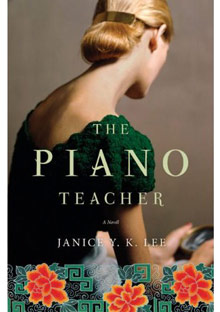
By Janice Y.K. Lee
336 pages; Viking
"I hope I don't destroy you," whispers the seductive Trudy Liang, a nervy, glamorous Hong Kong socialite, to Will Truesdale, a wildly attractive Englishman with a practiced aversion to love. It is June 1941. The international community in this British colony is still riding high—obscenely wealthy, genially intolerant of the local population, intoxicated with power and prestige. All that is about to end, as Japanese forces herd the privileged into internment camps, and loyalty is undermined by pride, self-interest, and fear. Janice Y.K. Lee's intensely readable debut novel, The Piano Teacher, alternates between that nightmarish moment in history and a decade or so later, when Claire Pendleton, a peaches-and-cream-pretty, unhappily married young English piano teacher with a tenuous connection to Hong Kong's expatriate society, finds herself drawn to the ambivalent Will, a man in thrall to a ghost. Lee, who grew up in Hong Kong and lived in New York, has a visceral understanding of cultural isolation and of the ruthless imperatives of race and class. War is the awful darkness at this novel's core, but there, too, is Trudy Liang, a fiercely willing prisoner of love. — Cathleen Medwick
336 pages; Viking
"I hope I don't destroy you," whispers the seductive Trudy Liang, a nervy, glamorous Hong Kong socialite, to Will Truesdale, a wildly attractive Englishman with a practiced aversion to love. It is June 1941. The international community in this British colony is still riding high—obscenely wealthy, genially intolerant of the local population, intoxicated with power and prestige. All that is about to end, as Japanese forces herd the privileged into internment camps, and loyalty is undermined by pride, self-interest, and fear. Janice Y.K. Lee's intensely readable debut novel, The Piano Teacher, alternates between that nightmarish moment in history and a decade or so later, when Claire Pendleton, a peaches-and-cream-pretty, unhappily married young English piano teacher with a tenuous connection to Hong Kong's expatriate society, finds herself drawn to the ambivalent Will, a man in thrall to a ghost. Lee, who grew up in Hong Kong and lived in New York, has a visceral understanding of cultural isolation and of the ruthless imperatives of race and class. War is the awful darkness at this novel's core, but there, too, is Trudy Liang, a fiercely willing prisoner of love. — Cathleen Medwick

By Elizabeth Strout
288 pages; Random House
"Don't be scared of your hunger," Olive Kitteridge always told her seventh-grade math students. "If you are scared of your hunger, you'll just be one more ninny like everyone else." Now Olive is retired, living out her life with her affable husband, Henry, in their small coastal town in Maine, and coming to understand that in spite of her efforts to subdue them, most hungers only intensify with age. Perceptive, deeply empathetic, and even more deeply flawed, Olive is the axis around which these 13 complex, relentlessly human narratives spin themselves into Elizabeth Strout's unforgettable novel in stories, Olive Kitteridge (Random House). "She didn't like to be alone," the narrator tells us shortly after a stroke confines Henry to a nursing home. "Even more, she didn't like being with people." This is the essence of Olive, contradictory, locked down tight, but capable of flights of emotion all the more heart-stoppingly beautiful because of their infrequency. As we meet the townspeople through her eyes—a young pharmacist widowed in a hunting accident, a feisty anorexic runaway, a family man building a boat too big to ever remove from his basement (to name only a few)—we feel acutely both the encroaching despair within Olive and the miraculous return of hope, "that inner churning that moves you forward," that "sudden, surging greediness for life." — Pam Houston
288 pages; Random House
"Don't be scared of your hunger," Olive Kitteridge always told her seventh-grade math students. "If you are scared of your hunger, you'll just be one more ninny like everyone else." Now Olive is retired, living out her life with her affable husband, Henry, in their small coastal town in Maine, and coming to understand that in spite of her efforts to subdue them, most hungers only intensify with age. Perceptive, deeply empathetic, and even more deeply flawed, Olive is the axis around which these 13 complex, relentlessly human narratives spin themselves into Elizabeth Strout's unforgettable novel in stories, Olive Kitteridge (Random House). "She didn't like to be alone," the narrator tells us shortly after a stroke confines Henry to a nursing home. "Even more, she didn't like being with people." This is the essence of Olive, contradictory, locked down tight, but capable of flights of emotion all the more heart-stoppingly beautiful because of their infrequency. As we meet the townspeople through her eyes—a young pharmacist widowed in a hunting accident, a feisty anorexic runaway, a family man building a boat too big to ever remove from his basement (to name only a few)—we feel acutely both the encroaching despair within Olive and the miraculous return of hope, "that inner churning that moves you forward," that "sudden, surging greediness for life." — Pam Houston

By James Collins
448 pages; Little, Brown
The arch and romantic read of any season, James Collins's Beginner's Greek (Little, Brown) makes you half-believe in miracles. With his triteness detector in high gear and his sights trained on social hypocrisy, Collins spins a chance encounter on an airplane (shy guy meets his dream girl) into a perfectly calibrated comedy of missed opportunities and muddled loves. — Cathleen Medwick
448 pages; Little, Brown
The arch and romantic read of any season, James Collins's Beginner's Greek (Little, Brown) makes you half-believe in miracles. With his triteness detector in high gear and his sights trained on social hypocrisy, Collins spins a chance encounter on an airplane (shy guy meets his dream girl) into a perfectly calibrated comedy of missed opportunities and muddled loves. — Cathleen Medwick

By Hannah Tinti
336 pages; Dial
A 21st-century novel in 19th-century drag, Hannah Tinti's The Good Thief (Dial) has a maimed, lonely orphan, a confidence man with a redemptive grin, a Dickensian gallery of shysters and thugs—a recipe for pseudo-Victorian gruel. But Tinti, like John Barth with his postmodern picaresque classic, The Sot-Weed Factor, has created one of the freshest, most beguiling narratives this side of Oliver Twist. Her prepubescent hero is Ren, abandoned as an infant (the loss of one of his hands is only the first of many mysterious losses) and raised in a ratty monastery orphanage. His "rescuer" is Benjamin Nab, an artful dodger with a gift for spinning lies. With Ren as accomplice and a repertoire of alarms and diversions, Nab cheats and grave-robs his way through the farms and towns of New England; yet the reader senses some untold story, a longing within this peculiarly charming man. And Ren, with his intuitive grasp of the laws of attachment, is a child of our own time: loving, wary, and ravenously hungry for home. — Cathleen Medwick
336 pages; Dial
A 21st-century novel in 19th-century drag, Hannah Tinti's The Good Thief (Dial) has a maimed, lonely orphan, a confidence man with a redemptive grin, a Dickensian gallery of shysters and thugs—a recipe for pseudo-Victorian gruel. But Tinti, like John Barth with his postmodern picaresque classic, The Sot-Weed Factor, has created one of the freshest, most beguiling narratives this side of Oliver Twist. Her prepubescent hero is Ren, abandoned as an infant (the loss of one of his hands is only the first of many mysterious losses) and raised in a ratty monastery orphanage. His "rescuer" is Benjamin Nab, an artful dodger with a gift for spinning lies. With Ren as accomplice and a repertoire of alarms and diversions, Nab cheats and grave-robs his way through the farms and towns of New England; yet the reader senses some untold story, a longing within this peculiarly charming man. And Ren, with his intuitive grasp of the laws of attachment, is a child of our own time: loving, wary, and ravenously hungry for home. — Cathleen Medwick

By Richard Price
464 pages; Farrar, Straus and Giroux
The rare high-profile murder one still hears of in New York City these days is often a 4-in-the-morning misstep, a confrontation of prosperous whites with local project kids looking for a quick score on streets where rich collide with poor like atoms compressed in a small, warm vessel. Lush Life (Farrar, Straus and Giroux), Richard Price's urban, witty, and wide-angled new novel, features just such an incident: a mugging gone wrong that leaves a young man shot on Manhattan's Lower East Side. It's a neighborhood now filled with super-fashionable clubs and no-name bars, but it was once the center of immigrant poverty so squalid that its need of reform helped bring about the American Progressive Era. Price, as he did in The Wanderers and Clockers, reveals his easy familiarity with characters from every level of the social pecking order: the harrowed detective, the guilt-ridden survivor, the savvy club owner, and the damaged teenager who pulled the trigger. He's as good with the psychological fragilities of the privileged and the automatic corruptions of the powerful as he is with the enforced ignorance of the youths in the projects down the street from hipster central. It's not just Price's much admired mastery of street language that grabs you (he also writes for HBO's The Wire, which feels Elizabethan in its creation of vivid contemporary language) but also his emotional reach, what you might call his heart: the careful revelation of detail that shows us, finally, the intricate sadness and hope of so many struggling new-century souls. — Vince Passaro
464 pages; Farrar, Straus and Giroux
The rare high-profile murder one still hears of in New York City these days is often a 4-in-the-morning misstep, a confrontation of prosperous whites with local project kids looking for a quick score on streets where rich collide with poor like atoms compressed in a small, warm vessel. Lush Life (Farrar, Straus and Giroux), Richard Price's urban, witty, and wide-angled new novel, features just such an incident: a mugging gone wrong that leaves a young man shot on Manhattan's Lower East Side. It's a neighborhood now filled with super-fashionable clubs and no-name bars, but it was once the center of immigrant poverty so squalid that its need of reform helped bring about the American Progressive Era. Price, as he did in The Wanderers and Clockers, reveals his easy familiarity with characters from every level of the social pecking order: the harrowed detective, the guilt-ridden survivor, the savvy club owner, and the damaged teenager who pulled the trigger. He's as good with the psychological fragilities of the privileged and the automatic corruptions of the powerful as he is with the enforced ignorance of the youths in the projects down the street from hipster central. It's not just Price's much admired mastery of street language that grabs you (he also writes for HBO's The Wire, which feels Elizabethan in its creation of vivid contemporary language) but also his emotional reach, what you might call his heart: the careful revelation of detail that shows us, finally, the intricate sadness and hope of so many struggling new-century souls. — Vince Passaro

By Candance Bushnell
448 pages; Voice
Take these ultra-urbanites for what they're worth (and it's a bundle): Schiffer Diamond, a glam, leggy actress of a certain age; her sexy ex, Phillip (his latest screenplay is Bridesmaids Revisited); a bratty beauty named Lola; an artsy walker; and a savage hedge-fund manager with an effortlessly chic wife (tip: smart women wear killer shoes with—surprise!—sensible heels), all occupying or orbiting the best address in town. One Fifth Avenue (Voice), by Candace Bushnell (Sex and the City), is all about passion—for prime real estate. A fable of glitter and greed. — Cathleen Medwick
448 pages; Voice
Take these ultra-urbanites for what they're worth (and it's a bundle): Schiffer Diamond, a glam, leggy actress of a certain age; her sexy ex, Phillip (his latest screenplay is Bridesmaids Revisited); a bratty beauty named Lola; an artsy walker; and a savage hedge-fund manager with an effortlessly chic wife (tip: smart women wear killer shoes with—surprise!—sensible heels), all occupying or orbiting the best address in town. One Fifth Avenue (Voice), by Candace Bushnell (Sex and the City), is all about passion—for prime real estate. A fable of glitter and greed. — Cathleen Medwick

By Andrew Sean Greer
208 pages; Farrar, Straus and Giroux
Andrew Sean Greer's The Story of a Marriage (Farrar, Straus and Giroux) is a beautiful, lyrical novel of the 1950s in a country at war with itself—sexually repressed, patriotic, torn by racism, and smitten with domesticity. Narrated by Pearlie, a woman married to a man with secrets, this is a book full of urgent questions. "How could I possibly explain my marriage?" Pearlie asks. "Anyone watching a ship from land is no judge of its seaworthiness, for the vital part is always underwater. It can't be seen." — Cathleen Medwick
208 pages; Farrar, Straus and Giroux
Andrew Sean Greer's The Story of a Marriage (Farrar, Straus and Giroux) is a beautiful, lyrical novel of the 1950s in a country at war with itself—sexually repressed, patriotic, torn by racism, and smitten with domesticity. Narrated by Pearlie, a woman married to a man with secrets, this is a book full of urgent questions. "How could I possibly explain my marriage?" Pearlie asks. "Anyone watching a ship from land is no judge of its seaworthiness, for the vital part is always underwater. It can't be seen." — Cathleen Medwick
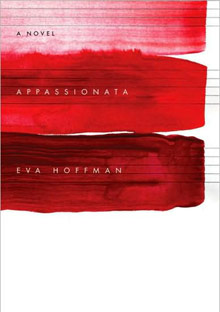
By Eva Hoffman
272 pages; Other Press
Adagio, accelerando—words that mark the way music moves through time and, in Eva Hoffman's acute new novel, Appassionata, describe the dynamic of human emotion, the subtle "vocabulary of the soul." Isabel Merton is a brilliant concert pianist, a medium who transmits the passions of Mozart and Chopin through her fingertips. Unmoored from her marriage, on tour in Europe, she meets Anzor, a charismatic Chechen exile. Their romance is hardly unexpected, but Hoffman's eloquent insights into "the intimate history of violence" ring startlingly true. — Cathleen Medwick
272 pages; Other Press
Adagio, accelerando—words that mark the way music moves through time and, in Eva Hoffman's acute new novel, Appassionata, describe the dynamic of human emotion, the subtle "vocabulary of the soul." Isabel Merton is a brilliant concert pianist, a medium who transmits the passions of Mozart and Chopin through her fingertips. Unmoored from her marriage, on tour in Europe, she meets Anzor, a charismatic Chechen exile. Their romance is hardly unexpected, but Hoffman's eloquent insights into "the intimate history of violence" ring startlingly true. — Cathleen Medwick

By Suzanne Finnamore
272 pages; Dutton
Everybody who gets divorced ought to write a memoir about it, as Suzanne Finnamore has done in Split (Dutton), as a service to the rest of us struggling to unravel the mysteries of marriage.
Finnamore's story opens with a bang: her husband downing two martinis and announcing that he's leaving her and their toddler and their stylish house in wealthy Marin County, California.
He swears there is no other woman, though, naturally, there is.
He's a liar and a smoothy—we all know the type—and he never deepens into a full-blown personality in Finnamore's story. Split is not a thoughtful autopsy of a marriage; it's impassioned and immediate, concerned only with its narrator's swinging moods as she moves through the stages of grief after being dumped. As such, it rises and falls on the sympathy the reader feels for the heroine tied to the railroad tracks. She's a little vain, a little superficial, a little too self-absorbed to really question how she wound up in such a pickle. Yet, for 250 pages, she is also very good company, thanks to a jaunty sense of humor and a lust for life that encompasses pork buns, histrionic gestures, and drunken sprees with her friends.
If I have to choose sides here, I'm buying the TEAM SUZANNE T-shirt. — Michele Owens
272 pages; Dutton
Everybody who gets divorced ought to write a memoir about it, as Suzanne Finnamore has done in Split (Dutton), as a service to the rest of us struggling to unravel the mysteries of marriage.
Finnamore's story opens with a bang: her husband downing two martinis and announcing that he's leaving her and their toddler and their stylish house in wealthy Marin County, California.
He swears there is no other woman, though, naturally, there is.
He's a liar and a smoothy—we all know the type—and he never deepens into a full-blown personality in Finnamore's story. Split is not a thoughtful autopsy of a marriage; it's impassioned and immediate, concerned only with its narrator's swinging moods as she moves through the stages of grief after being dumped. As such, it rises and falls on the sympathy the reader feels for the heroine tied to the railroad tracks. She's a little vain, a little superficial, a little too self-absorbed to really question how she wound up in such a pickle. Yet, for 250 pages, she is also very good company, thanks to a jaunty sense of humor and a lust for life that encompasses pork buns, histrionic gestures, and drunken sprees with her friends.
If I have to choose sides here, I'm buying the TEAM SUZANNE T-shirt. — Michele Owens
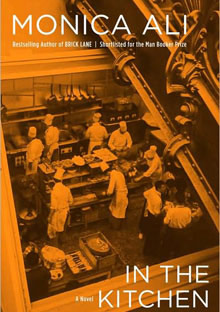
By Monica Ali
448 pages; Scribner
"When he looked back, he felt that the death of the Ukrainian was the point at which things began to fall apart," begins Monica Ali's In the Kitchen. "He could not say that it was the cause...because the events that followed seemed to be both inevitable and entirely random, and although he could piece together a narrative sequence and take a kind of comfort in that, he had changed sufficiently by then to realize that it was only a story he could tell, and that stories were not, on the whole, to be trusted."
The he is Gabriel Lightfoot, executive chef, and the kitchen is the high-end, high-stress orchestra of multinational sous-chefs, grill men, and pastry chefs (sometimes a United Nations Assembly, Gabe thinks, sometimes a pirate crew) behind restaurant Jacques, in London's once grand Imperial Hotel. Jacques' kitchen is full of stories, hard-luck tales the staff has brought from Byelorussia, Romania, Moldavia, Liberia, India, the Congo, even France, and amidst these stories, Gabe's life plan—opening his own restaurant, marrying his canny, gorgeous girlfriend Charlie, obliterating his father's provincial worldviews once and for all—begins to unravel like a piece of cloth in the textile mill where his father spent his life. Deeply flawed and wildly sympathetic, obsessed, hypocritical, delusional, humane, Gabriel Lightfoot is an unforgettable protagonist, his descent into lunacy frighteningly recognizable, individual, profound. — Pam Houston
448 pages; Scribner
"When he looked back, he felt that the death of the Ukrainian was the point at which things began to fall apart," begins Monica Ali's In the Kitchen. "He could not say that it was the cause...because the events that followed seemed to be both inevitable and entirely random, and although he could piece together a narrative sequence and take a kind of comfort in that, he had changed sufficiently by then to realize that it was only a story he could tell, and that stories were not, on the whole, to be trusted."
The he is Gabriel Lightfoot, executive chef, and the kitchen is the high-end, high-stress orchestra of multinational sous-chefs, grill men, and pastry chefs (sometimes a United Nations Assembly, Gabe thinks, sometimes a pirate crew) behind restaurant Jacques, in London's once grand Imperial Hotel. Jacques' kitchen is full of stories, hard-luck tales the staff has brought from Byelorussia, Romania, Moldavia, Liberia, India, the Congo, even France, and amidst these stories, Gabe's life plan—opening his own restaurant, marrying his canny, gorgeous girlfriend Charlie, obliterating his father's provincial worldviews once and for all—begins to unravel like a piece of cloth in the textile mill where his father spent his life. Deeply flawed and wildly sympathetic, obsessed, hypocritical, delusional, humane, Gabriel Lightfoot is an unforgettable protagonist, his descent into lunacy frighteningly recognizable, individual, profound. — Pam Houston
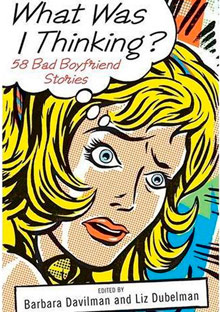
Edited by Barbara Davilman and Liz Dubelman
224 pages; St. Martin's Press
Oh, the stories women could tell. And 58 of them do in What Was I Thinking? 58 Bad Boyfriend Stories, edited by Barbara Davilman and Liz Dubelman. Most contributors are writers working in Los Angeles and New York. They're funny. They're smart. But, boy, are they slo-o-ow when it comes to knowing a relationship is dead. Sometimes it takes years in breakup "Crazytown." But usually, despite countless clues, it's an epiphany: Mr. Right invites you to have dinner with his married girlfriend so you can all be pals. He thinks deploying faux dog excrement at a party is hilarious. He uses "invertebrate" when he really means "inveterate" or comes home one day proudly flashing a cubic zirconia nipple ring. Try to top this heartbreaker: At the altar, he tells you he can't stand the embroidery on your wedding dress, would you mind wearing it backward. So many red flags wave in these witty, woeful tales, you'll think you're in China. A must-read for lovers of Schadenfreude. — Patricia Volk
224 pages; St. Martin's Press
Oh, the stories women could tell. And 58 of them do in What Was I Thinking? 58 Bad Boyfriend Stories, edited by Barbara Davilman and Liz Dubelman. Most contributors are writers working in Los Angeles and New York. They're funny. They're smart. But, boy, are they slo-o-ow when it comes to knowing a relationship is dead. Sometimes it takes years in breakup "Crazytown." But usually, despite countless clues, it's an epiphany: Mr. Right invites you to have dinner with his married girlfriend so you can all be pals. He thinks deploying faux dog excrement at a party is hilarious. He uses "invertebrate" when he really means "inveterate" or comes home one day proudly flashing a cubic zirconia nipple ring. Try to top this heartbreaker: At the altar, he tells you he can't stand the embroidery on your wedding dress, would you mind wearing it backward. So many red flags wave in these witty, woeful tales, you'll think you're in China. A must-read for lovers of Schadenfreude. — Patricia Volk
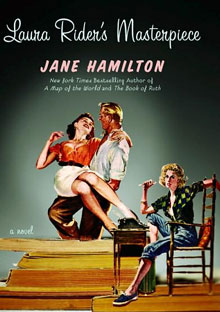
By Jane Hamilton
224 pages; Grand Central
"It is, after all, a universal truth that women lose weight when they fall in love"—that's one toast to the spirit of Jane Austen in Jane Hamilton's arch new novel, Laura Rider's Masterpiece. Laura, who has a garden design business, is a would-be romance writer; her husband, Charlie, a dewy-eyed stud. From a distance (Laura's artful e-mails) and up close (Charlie's hunky blond attentiveness), the two beguile and seduce Laura's idol, Jenna Faroli, a radio talk show host. A lightly literary tour de farce. — Cathleen Medwick
224 pages; Grand Central
"It is, after all, a universal truth that women lose weight when they fall in love"—that's one toast to the spirit of Jane Austen in Jane Hamilton's arch new novel, Laura Rider's Masterpiece. Laura, who has a garden design business, is a would-be romance writer; her husband, Charlie, a dewy-eyed stud. From a distance (Laura's artful e-mails) and up close (Charlie's hunky blond attentiveness), the two beguile and seduce Laura's idol, Jenna Faroli, a radio talk show host. A lightly literary tour de farce. — Cathleen Medwick

By Sue Miller
320 pages; Knopf
It's not that Sue Miller's The Senator's Wife (Knopf) is a cliff-hanger—though you sense right away there is a dangerous cliff somewhere. Meri—young, recently married, and desperate for something, though she doesn't yet know what—moves next door to Delia, the beguiling, aging wife of a legendary politician and philanderer. How these women circle each other, how Meri's need intersects with Delia's weary, necessary restraint, edges toward a crisis that seems, in retrospect, inevitable. A perfectly paced story of real-life marriage and its costs. — Cathleen Medwick
320 pages; Knopf
It's not that Sue Miller's The Senator's Wife (Knopf) is a cliff-hanger—though you sense right away there is a dangerous cliff somewhere. Meri—young, recently married, and desperate for something, though she doesn't yet know what—moves next door to Delia, the beguiling, aging wife of a legendary politician and philanderer. How these women circle each other, how Meri's need intersects with Delia's weary, necessary restraint, edges toward a crisis that seems, in retrospect, inevitable. A perfectly paced story of real-life marriage and its costs. — Cathleen Medwick

By Francine Prose
288 pages; Harper
One of the most moving poems in the English language, Gerard Manley Hopkins's "Spring and Fall: To a Young Child," is the elegiac undercurrent of Goldengrove (Harper), the latest novel by frequent O contributor Francine Prose. Her ungainly heroine is 13-year-old Nico, whose daring, beautiful sister Margaret drowns, leaving the family in ruins. Haunted by Margaret's memory, Nico, who has eerily begun to resemble her, is inexorably drawn to Margaret's unstable boyfriend, Aaron. An exploration of the fragility of adolescent identity and the perilous undertow of grief. — Cathleen Medwick
288 pages; Harper
One of the most moving poems in the English language, Gerard Manley Hopkins's "Spring and Fall: To a Young Child," is the elegiac undercurrent of Goldengrove (Harper), the latest novel by frequent O contributor Francine Prose. Her ungainly heroine is 13-year-old Nico, whose daring, beautiful sister Margaret drowns, leaving the family in ruins. Haunted by Margaret's memory, Nico, who has eerily begun to resemble her, is inexorably drawn to Margaret's unstable boyfriend, Aaron. An exploration of the fragility of adolescent identity and the perilous undertow of grief. — Cathleen Medwick
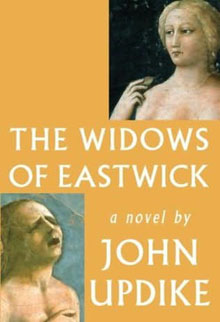
By John Updike
320 pages; Knopf
If wit is a form of witchcraft, igniting sparks from airy nothingness, concocting a peppery brew of words, then John Updike's powers are undiminished. In The Widows of Eastwick (Knopf), a mischievous updating of his 1984 novel, The Witches of Eastwick, three newly husbandless, elderly, witchy (rhymes with...) women regroup to tour far-off lands, then return to the coastal Rhode Island town once cursed by their youthful crimes of passion. In wickedly glinting sentences, Updike explores the distinctly unmagical humiliations of advancing age and the prickly temptations of sin. — Cathleen Medwick
320 pages; Knopf
If wit is a form of witchcraft, igniting sparks from airy nothingness, concocting a peppery brew of words, then John Updike's powers are undiminished. In The Widows of Eastwick (Knopf), a mischievous updating of his 1984 novel, The Witches of Eastwick, three newly husbandless, elderly, witchy (rhymes with...) women regroup to tour far-off lands, then return to the coastal Rhode Island town once cursed by their youthful crimes of passion. In wickedly glinting sentences, Updike explores the distinctly unmagical humiliations of advancing age and the prickly temptations of sin. — Cathleen Medwick
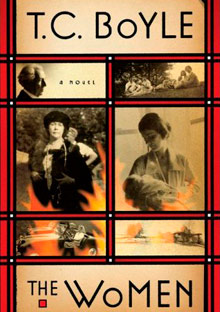
By T.C. Boyle
464 pages; Viking
In his new novel, The Women, T.C. Boyle deconstructs the private lives (and wives, etc.) of the revolutionary 20th-century architect Frank Lloyd Wright. With daredevil artistry, Boyle narrates the story backward in time, so that when we meet, say, Wright's glamorously narcissistic second wife, Maude Miriam Noel—successor to free-spirited Mamah and poor, abandoned Kitty—we've already seen the havoc she wreaks. Annotated, in piquant footnotes, by an ex-apprentice named Tadashi, the novel seems to rise fully articulated, like one of Wright's own iconic constructs. This is a tale of seductive genius: Who can resist a man who reshapes the world? — Cathleen Medwick
464 pages; Viking
In his new novel, The Women, T.C. Boyle deconstructs the private lives (and wives, etc.) of the revolutionary 20th-century architect Frank Lloyd Wright. With daredevil artistry, Boyle narrates the story backward in time, so that when we meet, say, Wright's glamorously narcissistic second wife, Maude Miriam Noel—successor to free-spirited Mamah and poor, abandoned Kitty—we've already seen the havoc she wreaks. Annotated, in piquant footnotes, by an ex-apprentice named Tadashi, the novel seems to rise fully articulated, like one of Wright's own iconic constructs. This is a tale of seductive genius: Who can resist a man who reshapes the world? — Cathleen Medwick

By Stephen L. Carter
528 pages; Knopf
"Focus. Scintillate. Intimidate." That's one key to political dominance in Stephen L. Carter's canny new thriller, Palace Council (Knopf), which ranges from exclusive 1950s Harlem drawing rooms to Washington enclaves where power corrupts and elegant conspiracies are born, from the lairs of 1960s radicals to the hellish haunts of torturers. Tip: Don't ignore the references to Paradise Lost; they'll take you places where angels fear to tread. — Cathleen Medwick
528 pages; Knopf
"Focus. Scintillate. Intimidate." That's one key to political dominance in Stephen L. Carter's canny new thriller, Palace Council (Knopf), which ranges from exclusive 1950s Harlem drawing rooms to Washington enclaves where power corrupts and elegant conspiracies are born, from the lairs of 1960s radicals to the hellish haunts of torturers. Tip: Don't ignore the references to Paradise Lost; they'll take you places where angels fear to tread. — Cathleen Medwick
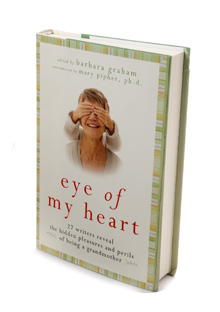
Edited by Barbara Graham
320 pages; Harper
Among the doting, self-doubting grandmothers in editor Barbara Graham's spry and unsentimental anthology Eye of My Heart (Harper) are Abigail Thomas, who relishes her late-life indolence, and Molly Giles, who watches her spoiled-rotten granddaughter with a mixture of irritation and awe ("Annika at three knows what she likes and doesn't like, and she doesn't like me"). Truth-telling with dollops of love. — Cathleen Medwick
320 pages; Harper
Among the doting, self-doubting grandmothers in editor Barbara Graham's spry and unsentimental anthology Eye of My Heart (Harper) are Abigail Thomas, who relishes her late-life indolence, and Molly Giles, who watches her spoiled-rotten granddaughter with a mixture of irritation and awe ("Annika at three knows what she likes and doesn't like, and she doesn't like me"). Truth-telling with dollops of love. — Cathleen Medwick




